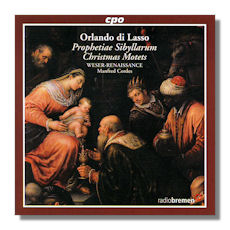
The Internet's Premier Classical Music Source
Related Links
- Lassus Reviews
- Latest Reviews
- More Reviews
-
By Composer
-
Collections
DVD & Blu-ray
Books
Concert Reviews
Articles/Interviews
Software
Audio
Search Amazon
Recommended Links
Site News
 CD Review
CD Review
Orlando di Lasso

Prophetiae Sibyllarum
Christmas Motets for Four Voices
Weser-Renaissance/Manfred Cordes
CPO 777468-2
Lassus' (Orlando di Lasso, 1532-1594) Prophetiae Sibyllarum are extraordinary works: they are various texts which foresaw the birth of Christ and date from as early as Greek antiquity. They appealed particularly to the Renaissance sensibility because they represented a tie between the modern and the Classical. The versions here are collections of these prophecies which Lassus set while in Munich. The texts themselves were probably written during Lassus' lifetime, or nearly so. Interestingly, it has only been in recent times that musicians have returned to the theme – of an essentially pagan prediction of the Messianic events.
Despite being widely considered the most accomplished composer of the polyphonic style of his day (until the nineteenth century elevated Palestrina "over his head"), Lassus departed from this strength in the music presented here; he limited himself to a sparser, four-part, style. It's predominantly syllabic and homophonic with much chromaticism. Weser-Renaissance very appropriately reflects, indeed embodies, the directness and concentration that aptly fit the assuredness of the act of prophesy, rather than its impact. Much as Handel knew how to do three hundred years later. Weser-Renaissance's gifted conductor, Manfred Cordes, has chosen to intersperse the Sybils' texts themselves with the more familiar Weihnachstmotetten. This works well.
The singing is consistently clear and clean. Gentle and beautifully projected. The two sopranos, alto, two tenors and bass on duty have a concentrated articulation and delivery without being even remotely precious. Though the sopranos are recorded perhaps a touch too forward. The seven instrumentalists, similarly, play with an elegance and closeness to the spirit as well as the technical requirements of the score that is persuasive and compelling in its simplicity. Such deceptively apparent modesty really does Lassus' conception here every good service. It sponsors a sense of awe and wonder that are all the stronger by the complete absence of anything in excess. At the same time, the pace (and internal tempi employed) of the nearly two dozen numbers (only one lasting more than four and a half minutes) help heighten the intensity of the theme, without a hint of fatigue and despite the immense weight that it inevitably carries. This is not typical Lassus; but it's convincing and compelling music in every way.
The achievement on this CD of Weser-Renaissance and Cordes is to communicate not only the splendor and beauty of Lassus' motets, his stature and dominant position throughout Europe – north and south – in the latter half of the sixteenth century (his talents were appreciated even while he was still a child). But also the ways in which his urbanity, sophistication and multiplicity of interests and achievements (in true Renaissance fashion) explain the originality and breadth of such compositions as the Prophetiae Sibyllarum.
Weser-Renaissance accomplish this by an almost low key, understated even, approach to their delivery. Nothing bombastic or too rhetorical – in spite of the elevated subject matter. This restraint emphasizes the total control which Lassus exercised over his material, the extent to which its text conveys as much as the harmonies and instrumental and vocal textures do, and the composer's sense of having "captured" the unknown… indeed, the unknowable. This success is also due to the flexibility with which Weser-Renaissance works: different numbers of performers and differing selections of which specialists (from a larger body of musicians) will be involved according to the precise musical demands of the occasion.
The production standard, acoustic and informative liner notes are all up to cpo's usual high standards. The full texts are reproduced in Latin, German and English, too. If you have never quite got to grips with Lassus and/or want to explore some of his more remarkable and perhaps less known output, then this is an excellent way to start. There is only really one other recording to consider, that by Walter Testolin with Schola Gregoriana and De Labyrintho from 2007 on Stradivarius (STR33762). Cordes' conception is slightly more "considered" and focused. Spectacular "effects" are nowhere to be seen. This conception must be close to how a performance from the sixteenth century must have sounded. Recommended.
Copyright © 2010, Mark Sealey.




















